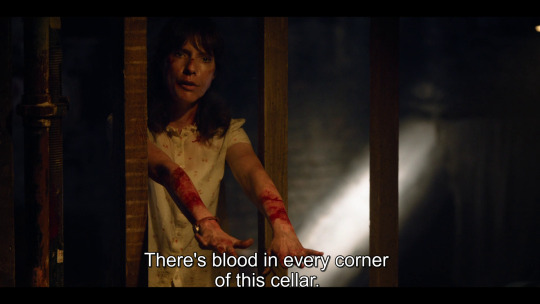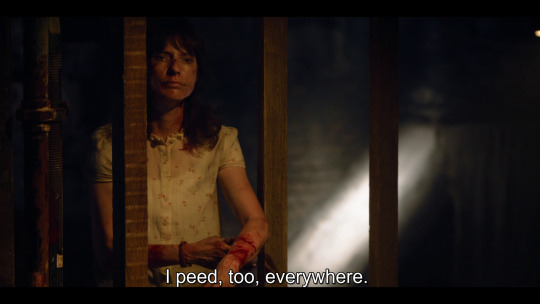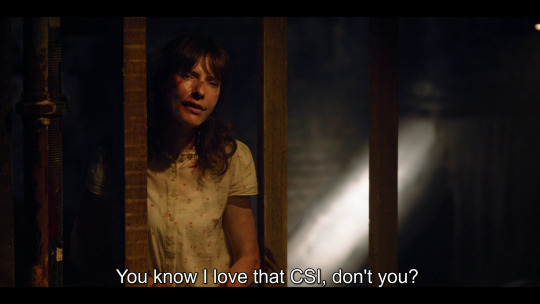#inside man bbc
Text
Okay so I watched Inside Man on Netflix. It's interesting. More importantly, it's a masterclass in crafting likeable characters and how the POV we follow in a scene affects the way we see a character. Also, this somehow relates to the Star Wars Prequels, I promise! 😆
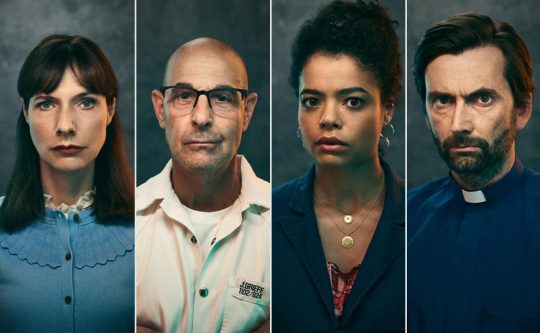
The moral of the series is that "everyone is a murderer, all it takes is a good reason and a bad day." The main characters are:
A vicar who - through a huge misunderstanding - has now locked his son's tutor in his basement and doesn't know how to get out of this situation, played by David Tennant.
A convicted murderer and ex-criminal psychology professor who solves crimes from his cell, as he waits for his execution, played by Stanley Tucci.
So a man who locked a woman in his cellar and a guy who murdered his wife. In any other movie, these guys are the villains. Yet, both of these characters are extremely likeable!
This is achieved through how relatably they behave in their relationships (kind, humble, humorous)...

... and through the emotion and/or charisma brought by the actors playing them (it's THE DOCTOR/CROWLEY and Stanley Friggin' Tucci)... but also through the amount of screen time they get.
We're with them for most of the show. There's other characters (the journalist, the trapped tutor and the vicar's wife) and subplots, of course, but they're our two anchors.
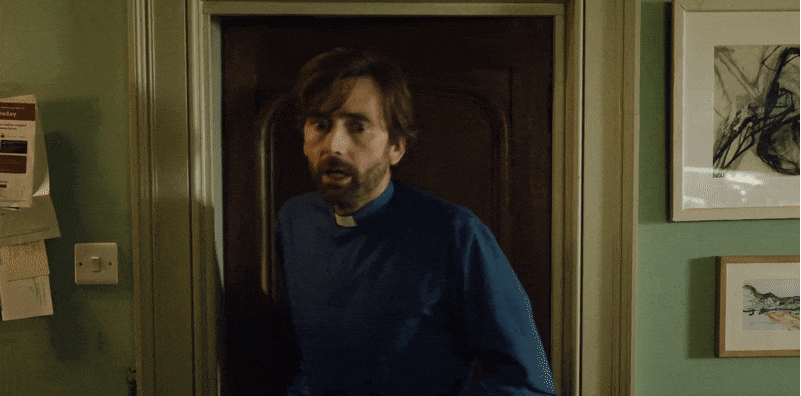
So when I'm watching David Tennant lock his son's tutor in his cellar and consider if he should free her - only to see him and his wife make things worse - I'm not thinking "you monster" like I do when I see Buffalo Bill in Silence of the Lambs for example.
No, I'm thinking "goddammit vicar you're making things worse, it'll come back to haunt you, there's still a chance to turn back, please!" I'm rooting for him to make the right choice because I'm seeing him struggle and despair and hesitate throughout many scenes.

When I'm watching Stanley Tucci guiltily say he deserves death, after being so darn charming, humble and in clear possession of a moral compass, my instinct as a viewer isn't to go "he's right".
It's to go "aaaw, no it's fine, everyone makes mistakes."
And these characters remain likeable and/or relatable for a huge chunk of time... until, every once in a while, the show reminds you that, "remember, these guys are criminals."
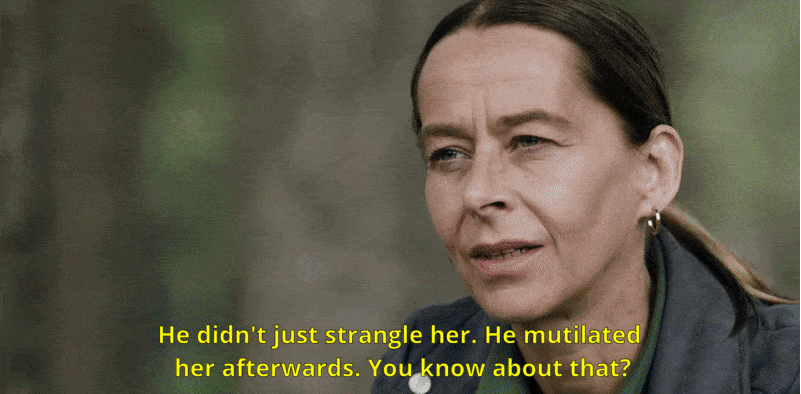
"One of them's killed his wife then decapitated her, and the other one is contemplating murder, so they did/are doing evil stuff, they're the villains and you shouldn't grow fond of them."
Then it goes back to making you empathize with them again.
It's quite the emotional roller-coaster, very intriguing yet frustrating, which I have to guess is exactly what the show is going for.
But the point is: the amount of time we spend with these characters is partially what elicits this emotional reaction out of us.
If we consider the tutor's character:
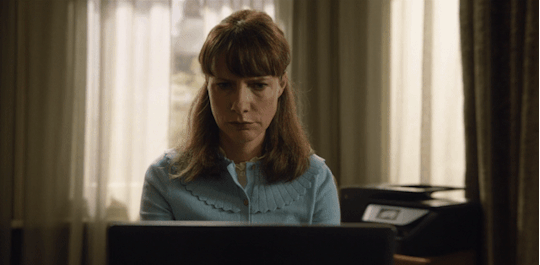
For all intents and purposes, we should feel sorry for her, or full-on fucking love her. Objectively-speaking, she's:
smart but obviously scared,
we establish early on that she has a brave heart and stands up for oppressed women,
she thinks she's trapped by a pedophile or a man defending a pedophile, figures he'll inevitably try to murder her, yet manages to stay resourceful, determined and cool-headed despite it all.
She's an absolute superhero.
But that's not how the narrative frames her.
She's framed as an antagonistic force, in the vicar's subplot.
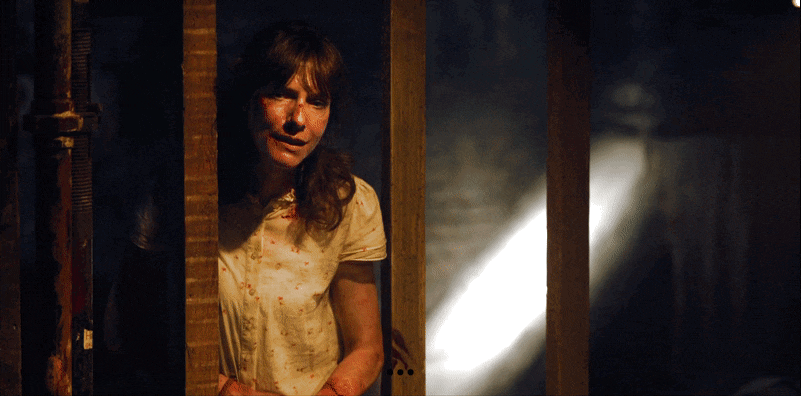
She may be the one tied up in a basement, but she's in control and the vicar is not. She's almost framed as being in a position of power (when she's really not), which leads the audience to view Tenant's vicar as an underdog.
When the vicar is trying to look for alternatives to end this situation so that he doesn't have to kill her, she's unhelpful,
and even starts pitting the vicar and his wife against each other.
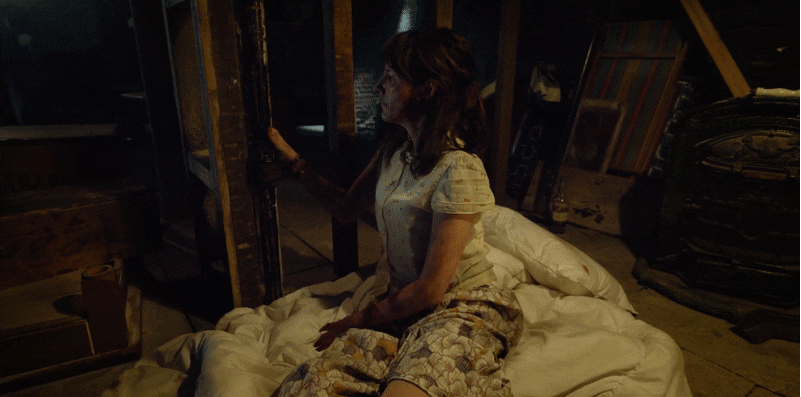
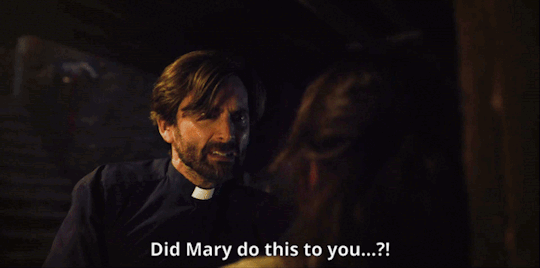
Again, in-universe, she's scared shitless and in "fight-or-flight" mode. She's putting up a front because she's just trying to get outta this alive. She's the victim, here, not the vicar who captured her.
But as a viewer, you don't feel that, despite objectively knowing that. Why and how?
Because we barely see this character, compared to Tenant's vicar. So we have more time to grow to feel for him. There's "why".
Also 90% of what we do see of the tutor is her being aggressive, manipulative, sometimes downright merciless and we're seeing her from the POV of the vicar or the vicar's wife. There's "how".
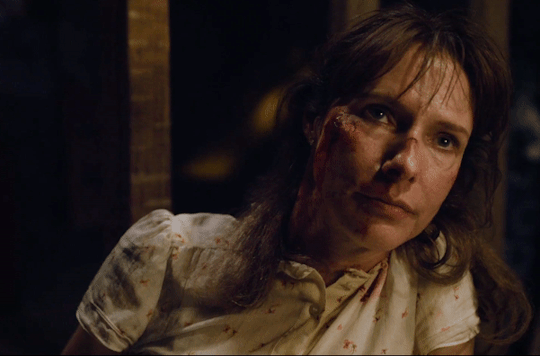
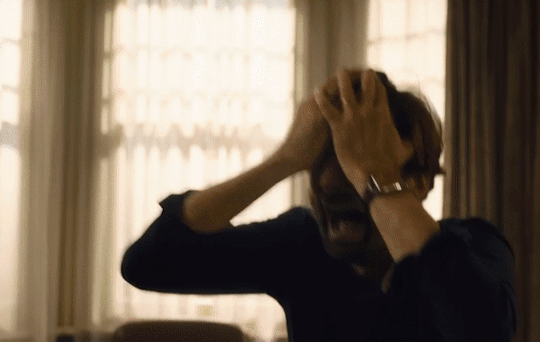
Result: the viewer feels sorry for the captor and frustrated towards the captive.
This isn't a rational reaction, it's an emotional one (the goal of any visual artform being to get an emotional reaction out of the viewer).
Which means the series and Stephen Moffat effectively did their job.
How does this relate to the Prequels?
Well, a lot of people see the Jedi in a negative light in the Prequels, and Anakin in a more sympathetic one.
Even though the Prequels are about how a good man becomes bad, and even though the Jedi embody one of the major Star Wars themes (selflesness) as opposed to Anakin who clearly displays the anti-theme (selfish)... a majority of fans feels more for the latter than the former. Why?
Because the Prequels unintentionally do what Inside Man does purposefully. You react to Anakin like you react to the vicar. You react to the Jedi like you react to the tutor.
Simply put: Anakin has more screen time than the Jedi.
And we don't just see him more, we see him struggle, we see him about what he knows to be morally right vs what he really wants, we see him be overtaken by his own fear...

... and just by contrast, that makes him more relatable than the Jedi, who have already overcome their character arcs and mostly all learned to keep their flaws in check.
The narrative doesn't intend to frame them as antagonistic. We do see them talk about how worried they are, we do see them emote.

And if you think about it, it's easy to see why:
their entire way of life is going to crap,
their values are being corrupted as they're forced to fight and die, alongside their clone brothers, in a war they wanted no part of,
they sense that the Force is close to the breaking point and that the galaxy's inhabitants are suffering on the daily.
But, for example, when Mace or Ki-Adi Mundi are shown expressing concern in the Prequels... as worried as they are, in-universe... out-of-universe, their measured reactions doesn't emotionally impact a viewer as much as Anakin's intense ones do.




So a big chunk of the audience will sympathize more with him than them. But like the tutor in Inside Man, the Jedi are objectively the victims and Anakin is objectively an unstable space-nazi who betrayed and destroyed them.
Just because we're not shown these characters be worried beyond just monotonously saying "I'm worried" doesn't mean they're not actually worried as Anakin is in Revenge of the Sith (if not more).
However we don't see it.
Because these three films aren't about the Jedi Order, they're about the Republic and about Anakin and about how each of these two beautiful things were corrupted (by Palpatine and by themselves) into becoming the very thing they stood against.
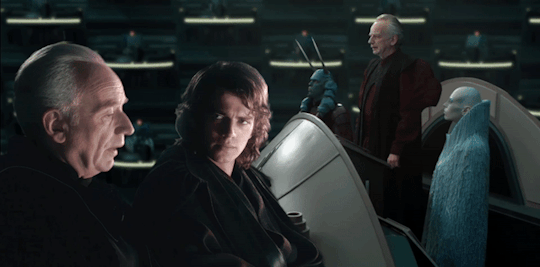

The Jedi aren't a factor in either of those two themes set up by George Lucas.
They became a factor when fans - who despite not liking the Prequels, still admirably chose to engage with the material - made the Jedi be more important to the narrative of the Prequels by re-framing these films as "The Failure of the Jedi".
Now, should Lucas have recognized that most fans wouldn't give two shits about why a Republic falls or the "matinee serial" format, and would've rather he focused on the Jedi, and developed them accordingly? Probably.
But good luck telling an indie filmmaker with a bunch of money how to tell the story he wants to tell.
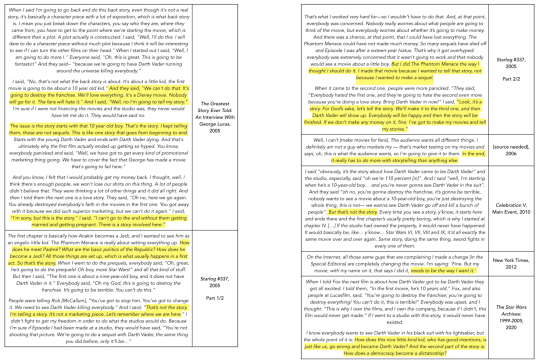
Could Lucas have done more with the Prequels to highlight the fact that the Jedi are the underdogs of the story, not Anakin's oppressors? Yes.
But, firstly, he probably didn't think that was a point that needed explaining. And secondly, as he explained at Cannes, in 2002, feature films are a very limiting format to tell a story, especially one of the Prequels' scale. If it doesn't directly contribute to the story you're telling... it's gotta go.
A limited show would've been better to cover every aspect of the Prequels more in detail and avoid confusing the audience re: who they should be rooting for.
Which is why it's interesting, to me, that Stephen Moffat used his limited show to INTENTIONALLY confuse the audience! 😃
#the screenwriter part of me was geeking out and I had to write this#one of my longest posts and it's about Inside Man of all things wtf#long post#discussion#star wars analysis#meta#SW Meta#Inside Man#inside man bbc#David Tenant#Hayden Christensen#harry watling#Anakin Skywalker#stephen moffat#george lucas#Jedi Order#Jedi Council#Mace Windu#star wars#revenge of the sith#star wars prequels#media#Netflix#BBC#dolly wells
574 notes
·
View notes
Text
Inside Man is interesting because you get to watch David Tennant basically stumble his way into kidnapping a lady, like some horribly morbid episode of Benny Hill.
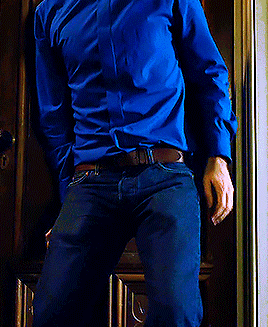
#david tennant#inside man#inside man bbc#inside man netflix#inside man harry#good omens#crowley#the tenth doctor
32 notes
·
View notes
Text
WHY THIS IS SO ACCURATE HELP
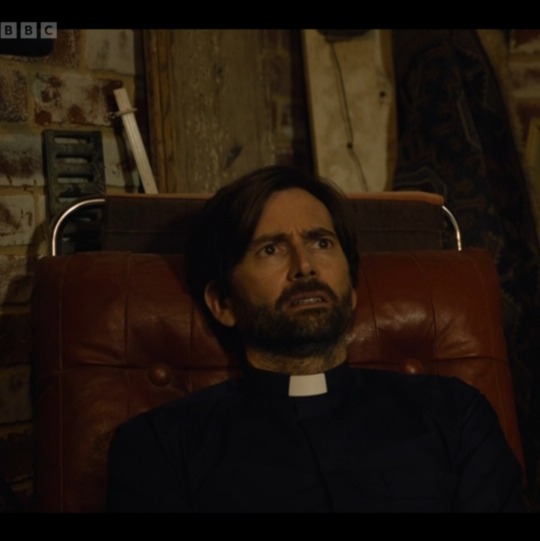

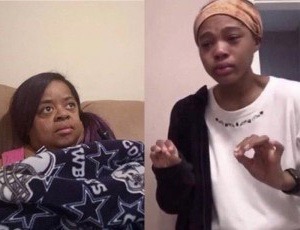
331 notes
·
View notes
Text

guess who finished watching inside man the other day… what a sexy vicar
remember that reblogs > likes
132 notes
·
View notes
Text
David Tennant is probably the most recognizable person on British TV. In the last year he was on inside man, he’s Crowley and he is the doctor again!
24 notes
·
View notes
Text
Steven Moffat goes inside us. As usual

Well, I watched 'Inside man'.
First of all: it`s beautiful. Just beautiful. I loved every single moment of it.
Second: it`s very much Moffat.
And, opposite to what most of the reviews say, it is not a crime drama.
I won`t reveal any plot details here to not spoil the story to those who haven`t watched the series yet. I`ll just make some notes.
We all know, I presume, that Steven Moffat loves complicated stories. More than that – he obviously loves the metaphorical ones. That`s why I don`t buy any complaints from the reviewers who say that all the stuff in the film is stupid, unnatural and not believable.
Of course, it is! Because, as often does in Moffat`s stories, the events are taking place in the real world and in the space of a metaphor at the same time.
Here we have: one decent loving vicar, one very clever woman, one confused vicar`s wife, one terrified teenager and one vicar`s home.
After the trigger`s pulled things start to happen, and yes it might be masked as a crime drama but it is not.
Actually, it is a philosophical exercise that Moffat establishes for us just to make us think on a start thesis.
Everyone is a murderer. You just need to meet the right person.
Taking aside the fact that this phrase is a parody of a romantic cliché 'Everyone can love. You just need to meet the right person', let`s think about the structure of the story.
One man, – a really good, decent man – takes the thing that can totally compromise him or (which is much worse for him) his beloved son. Then the misunderstanding happens and the man must make a choice.
The scared helpless woman or his son.
What would he choose?
That`s the question that you might ask but that`s the wrong question.
Don`t we remember that Steven Moffat is a former school teacher?
The right question is: what should he choose?
We need to have this question in our minds during the whole series to the end.
If we do, all the 'stupidities', all the 'strange things', and all the 'horribly wrong desisions' start to make sense.
It`s stupid to take from people things which might content you don`t know what. It`s stupid not to say the truth when you are asked about those very things which turned out to be very bad, dirty, and dangerous. It`s incredibly stupid to lock people in the cellar in order to hide bad things which are not even yours!
But that`s the point.
All the bad, wrong, terrible decisions lie exactly at the crossroads between what we would and what we should do.
'Inside man' shows us dozens of such crossroads. Every character – including the victim of an assault locked in the cellar – has his or her own moments where they could turn to another way. But they didn`t.
It is not about the police officers` behaviour (why not ask more questions to that suspicious man?) or the vicar`s strange moral stands (why not confess the bad thing is someone else`s – really guilty one?). It`s about our choices and our reasons which lie under them.
It`s a model of the soul which is trapped in impossible circumstances and the mind under unbelievable pressure. And our inner moral judge who condemns without mercy because he knows that his own days are cut.
And it is a story about the hope of young and clean life which denies being doomed and – as we are told at the finale of the series, recovers.
Bless him.
I mean it.
44 notes
·
View notes
Text
i wanna fight steven moffat over 'inside man' i really do.

5 notes
·
View notes
Text
WHY AM I FREAKING OUT SO MUCH ABOUT THIS SHOW WHEN EVERYONE ELSE IS MAKING JOKES OF IT AND COMMENTING HOW HOT DAVID IS AND WRITING SMUT ABOUT THE VICAR LIKE DID WE WATCH THE SAME SHOW?? OR AM I JUST FREAKING OUT BECAUSE IM DRUNK AND ITS TWO AM??? I DONT KNOW HOW I SHOULD FEEL RN ILL JUST CONTINUE TO CRY !!!
10 notes
·
View notes
Text
Spoilers about the “Inside man” on Netflix and its similarities with SoTL (specifically Hannibal’s character and his relationship with Clarice)
TL;DR: I think they drew inspiration by the movie when it comes to grief’s and Beth’s character and while they are completely different media and cases, they were an enjoyable duo I wish we had more time to see together, because it would have been an interesting concept to explore more (especially if they shared some more common elements with Hannibal and Clarice)
Alright so: lemme tell ya I liked the show. Could have been better? yes. Did I still enjoy it and had a blast? absolutely!
That being said: I couldn't help but notice a familiar pattern with Grieff’s Character/Beth and Hannibal/Clarice
Everyone’s keep talking about how Tucci’s Character was Sherlock-ish (well thats what happens when the writer of Sherlock writes more shows ig) but in my eyes he mostly was Hannibal-ish.
Grieff wasn't all that ironic as Sherlock was throughout the show (kinda), and he wasn't trying to ‘show off’ either as Sherlock did. He also didn't solve the cases with the help of some rather deux ex machina clues (like Sherlock did sometimes)
He was mostly reversed, stoic, calm, ready to point out the hypocrisies in one’s morals and enjoyed helping Beth discover the clues for her case (don't these things remind you of Hannibal?).
Beth is also an ambitious young woman, a journalist who writes about crimes in general, who is dedicated to what she does.
episode 1:
Her first meeting with Grieff had SoTL vibes. His indifference at first, then starting to take a like on her. Her trying to figure out how to ask the right kind of questions but also making sure she's respected and calling him out whenever she feels she should. And when he revealed that he chooses his cases based on ‘moral worth’ feels like he shares a piece of himself (perhaps a more vulnerable one?), smth he wouldn't do unless he knew she was a ‘decent’ human. And as dilon said “you liked it, you talked a lot”, smth that neither of them would do unless they found an interest in the other person
Episode 2:
Episode’s 2 little game of ‘would you rather help your friend or get more material for your job?’ felt smth like Lecter would do too. I didn't expect her to choose the latest but then again, it’s not like they were bffs.
Also her going all around searching for clues with him on the phone, directing her and being pleased when she finds the solution? definitely smth Lecter would do to, had he being in prison in 2022 and not in the 80′s. And again, I enjoyed their banter. And their little talk at the end, him making fun of her moral codes while she just saw the woman who was the murderer running away?? I found it funny tbh
Episode 3:
Morag’s speech during ep 3 was also a nice touch. Making sure Beth never forgets that after all these, Grieff is a monster (Just like what everyone kept telling to Clarice, both the media and her closer environment). Her determination to continue her job/finding Janice im sure pleased Grieff (as for why he wanted to listen to her reaction on the phone: the man loves playing games)
Episode 4:
Episode’s 4 opening scene has similar vibes, explaining hard to grasp concepts in a simpler way. And him sending the men of his ex father-in-law to the vicar’s house, in a pretence he had confessed where he had hidden his wife’s head, so he could help Beth? ingenious and Lecter should take some notes tbh
On the whole:
While I recognise this was not 100% intended by Moffat, I would like to believe he drew some inspo by SoTL and Hannibal’s relationship with Clarice.
It was obvious they were never meant to be like them (let alone how their relationship developed in the Hannibal book) but, for sure it felt refreshing to watch something that shared some common clues with one of my favourite couples in media. Especially with a couple we are not going to watch together in the big screen because of copyright issues...
#so yeah#I ramble sometimes#I spent an hour writing this#mostly because I rewatched the scenes between these two#no im perfectly normal why are u asking??#please don't get this post in the way im shipping the or smth#god forbid no#It just was a pleasant surprise to see smth I like in media#smth which reminded me of clannibal#of course smth tells me im on my own on this one... no wonder!!#but I would like to read what you people think too!!#inside man#inside man bbc#SoTL#silence of the lambs#the silence of the lambs#hannibal lecter#clarice starling#jefferson grieff
7 notes
·
View notes
Text
limited tv-series have superb writing periodt
5 notes
·
View notes
Text
Yes, I would love to financially contribute financially to my favorite actors' shows but streaming services are making it a fucking nightmare. Amazon prime for Good Omens and Broadchurch, Showtime for Masters of Sex, Disney plus and Max for Doctor Who and Prodigal Son, Britbox for Staged, Netflix for Inside Man, etc, etc, etc. I love them but I am so poor. 😭 Just fucking bundle or something. When did this become like cable again?
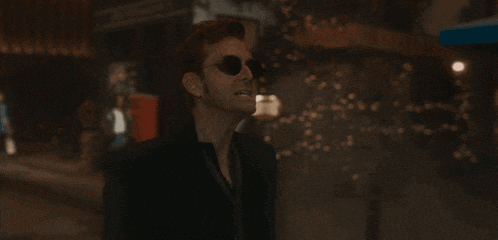
#good omens#michael sheen#david tennant#masters of sex#Doctor Who#prodigal son#staged#streaming services#streaming wars#Broadchurch#inside man bbc#inside man netflix
20 notes
·
View notes
Text
Ghosts’ Larry Rickard Explains Why They Chose the Captain’s First Name
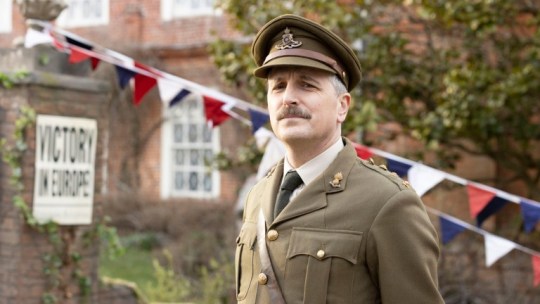
Photo: Monumental,Guido Mandozzi
It couldn’t be a joke. That was one rule laid down by the Ghosts creators when it came to choosing a first name for Willbond’s character. Until series five, the WWII ghost had been known only as The Captain – a mystery seized upon by fans of the show.
“It was the question we got asked more than anything. His name,” actor and writer Larry Rickard tells Den of Geek. “Once we got to series three, you could see that we were deliberately cutting away and deliberately avoiding it. We were fuelling the fire because we knew at some point we’d tell them.”
In “Carpe Diem”, the episode written by Rickard and Ben Willbond that finally reveals The Captain’s death story, they did tell us. After years of guessing, clue-spotting and debate, Ghosts revealed that The Captain’s first name is James. At the same time, we also learned that James’ colleague Lieutenant Havers’ first name was Anthony.
The ordinariness of those two names, says Rickard, is the point.
“The only thing we were really clear about is that we didn’t want one of those names that only exists in tellyland. It shouldn’t be ‘Cormoran’ or ‘Endeavour’. They should just be some men’s names and they’re important to them. The point was that they were everyday.”
Choosing first names for The Captain and Havers was a long process not unlike naming a baby, Rickard agrees. “It almost comes down to looking at the faces of the characters and saying, what’s right?”
“We talked for ages. For a long time I kept thinking ‘Duncan and James’, and then I was like ah no! That would have turned it into a gag and been awful!” Inescapably in the minds of a certain generation, Duncan James is a member of noughties boyband Blue. “Maybe with Anthony I was thinking of Anthony Costa!” Rickard says in mock horror, referencing another member of the band.
Lieutenant Havers wasn’t just The Captain’s second in command while stationed at Button House; he was also the man James loved. Because homosexuality was criminalised in England during James’ lifetime, he was forced to hide his feelings for Anthony from society, and to some extent even from himself.
In “Carpe Diem”, the ghosts (mistakenly) prepare for the last day of their afterlives, prompting The Captain to finally tell his story. Though not explicit about his sexual identity, the others understand and accept what he tells them – and led by Lady Button, all agree that he’s a brave man.
Getting the balance right of what The Captain does and doesn’t say was key to the episode. “It wasn’t just a personal choice of his to go ‘I’m going to remain in the closet’,” explains Rickard. “There wasn’t an option there to explore the things that either of them felt. That couldn’t be done back then – there are so many stories which have come out since the War about the dangers of doing that.
“We wanted to tell his personal story but also try to ensure that there was a level at which you understood why they couldn’t be open, that even in this moment where he’s finally telling the other ghosts his story, he never comes out and says it overtly because that would be too much for him as a character from that time.
“He says enough for them to know, and enough for him to feel unburdened but it’s in the fact that they’re using their first names which militarily they would never have done, and in the literal passing of the baton”.
The baton is a bonus reveal when fans learned that The Captain’s military stick wasn’t a memento of his career, but of Havers. As James suffers a fatal heart attack during a VE day celebration at Button House, Anthony rushes to his side and the stick passes from one to the other as they share a moment of tragic understanding.
“From really early on, we had the idea that anything you’re holding [when you die] stays with you. So it wasn’t just your clothes you were wearing, we had the stuff with Thomas’ letter reappearing in his pocket and so on. And the assumption being that it was something The Captain couldn’t put down, it felt so nice to be able to say it was something he didn’t want to put down.”
Rickard lists “Carpe Diem”, co-written with Ben Willbond, among his series five highlights. He’s pleased with the end result, praises Willbond’s performance, and loved being on set to see Button House dressed for the 1940s. He’s particularly pleased that a checklist of moments they wanted to land with the audience all managed to be included. “Normally something’s fallen by the wayside just because of the way TV’s made, it’s always imperfect or it’s slightly rushed, but it feels like it’s all there.”
Rickard and Willbond also knew by this point in the show’s lifetime, that they could trust Ghosts fans to pick up on small details. “Nothing is missed,” he says. “Early on, you’re always thinking, is that going to get across? But once we got to series five, there are little tiny things within corners of shots and you know that’s going to be spotted. Particularly in that very short exchange between Havers and the Captain. We worried less about the minutiae of it because you go, that’s going to be rewound and rewatched, nothing will be missed.”
The team were also grateful they’d resisted the temptation to tell The Captain’s story sooner. “We’d talked about it every series since series two, whether or not now was the time, but because he’s such a hard and starchy character in a lot of ways you needed the time to understand his softer side I think before you had that final honest beat from him.”
“What a ridiculously normal name to have so much weight put on it for five years,” laughs Rickard fondly. “Good old James.”
From Den of Geek
#bbc ghosts#bless you larry for doing all these den of geek interviews#I wonder if they just did one marathon session with him#inside ghosts was kind of disappointing this week#I guess Ben just wants to let the episode speak for itself and you're like yes but I would like to hear you talk about every detail#trust me we will be interested#long post#I really thought they loved the joke of nearly saying the Captain’s name so much that they'd never reveal it#so it's so lovely that they were like no this is not a joke name; he's a real man with an ordinary name#and we are going to tell you that in the most devastatingly romantic way#I am eating my words and they are delicious with that spread on top#also 'that's going to be rewound and rewatched' = 'I know you people are loopy so here is content specifically for you'#bbc ghosts spoilers
897 notes
·
View notes
Text
I love that no matter how many fucking times alison gestures to exactly where the ghosts are mike will still look up in the air for them. the fact that he makes an attempt to interact directly with them instead of just always looking to alison is so charming. but also adhd king.
#mike cooper my bestie mike cooper#when julian records him talking about the house and he looks up and goes 'thanks julian'#like... he knows that means he's there and he believes enough to interact with them even when alison isnt there#like. he means so much to me#it would be so easy for him as a character to just always be the straight man#and be going along with it for alisons sake but then roll his eyes#but he doesnt!!! he trusts that they're there! he tries to talk to them when she's not there~!!#yeah maybe he's a little bit scared of them at first but then those are his wife's family!#that's his wife's group of friends and he wants to be included!!#he wants to know their inside jokes. he pays attention. he knows which one is which.#when alison says mary is gone he says#'the one that smells like toast and spies on me in the toilet' like. yeah she had more personality than that#but he remembers who she is!!!!!!!!!!#and acknowledges that alison needs to mourn!#i'm gonna sobBB!!!!!!!!!!!!!!#bbc ghosts#i cant watch ghosts high i get so emotional
325 notes
·
View notes
Text
the snail in my ear telling me i have to consume every single david tennant content at the beginning of 2024
235 notes
·
View notes
Text
Moffat and his view of moral worth
I think we all can agree that Steven Moffat is an intelligent man. And he is a very smart author, as I can see, who is usually totally aware of what he does and what he wants to say. So when I am struck with something in Moffat`s stories, I try to return to the moment later and make a lookup.
That is what happened to me with Inside man when I re-watched the show.
Spoilers alert.
I said already that this is a story about not what the main character might do but what he should do. And now I went further – ok, we know, more or less, what he should do but what it actually is and what is this story about due to the context?
Let me explain.
Harry 'the bloody vicar' Watling at the beginning of the film finds himself in very complicated circumstances. He needs to make a choice. And he does. Then again, again, and again. With every choice done things go darker and the finale is totally dramatic. But there is one moment that like a kind of flickering light shows another way.
It is an episode when the shocked and frightened vicar`s son cries in the kitchen because he thinks he killed the woman and – in such a horrible state – to his father`s offer to take the guilt this young man answers, 'Get away from me!'.
This young man, who has all the problems teenagers do, searching for his place in the world, the love of his company, as we know, doubting himself, has enough bravery and strength to decline evil.
And it is not an accident.
I think Moffat here tells us a very old story. You know, Harry from the very beginning knew what he was supposed to do. He was absolutely aware of what the right decision would be. He just didn't want to make it. He knows what people are (because he is a vicar, so he must) and he knew that they never believe that the suspicions about the vicar`s son are just suspicions. He knew that the people would gossip even if the police would say that his son is not guilty. He knew that people usually judge based not on reality but on the things in their heads. And he knew that if there is something in someone`s head it`s really hard to remove it.
So what? What should he do knowing that?
He should accept it.
Just do what is right and have the reaction. If he really wanted to do the right thing, of course. Because all the way during the story he keeps repeating, 'I`m trying to do the right thing!'. No. He is trying to do the useful thing and lies to himself. Which is totally understandable in the situation but still is not the right thing.
From this point of view, the film looks like a very Christian story. Because Jesus also knew that people would not understand Him, He knew they would treat Him as a criminal, and He knew that He would be persecuted by the authorities. And He still didn`t fight back. He just did what He did. And that is the point. The Christian story is not about giving the father for children`s sake but about doing in the way that children can see as a standard to which they could line with.
Moffat`s films often can be read one through another. That`s exactly what Mother Superior says in the first episode of Dracula. 'Faith is not a transaction. You do not palter with Infinite. You are lining with It.'
So, now we can see that the start thesis, 'Everyone is a murderer. You just need to meet the right person.' is fake. That`s Moffat. He gives you a slogan and sees what would you do with it. But he always has the real thing in the story. And here it is.
And if you doubt that, remember what the vicar's son's name is.
Ben. The short form of Benedict – 'blessed one' – or Benjamin – 'son of the right hand'.
Choose what you like more.
Personally, I think, in a sense, they are both.
9 notes
·
View notes

